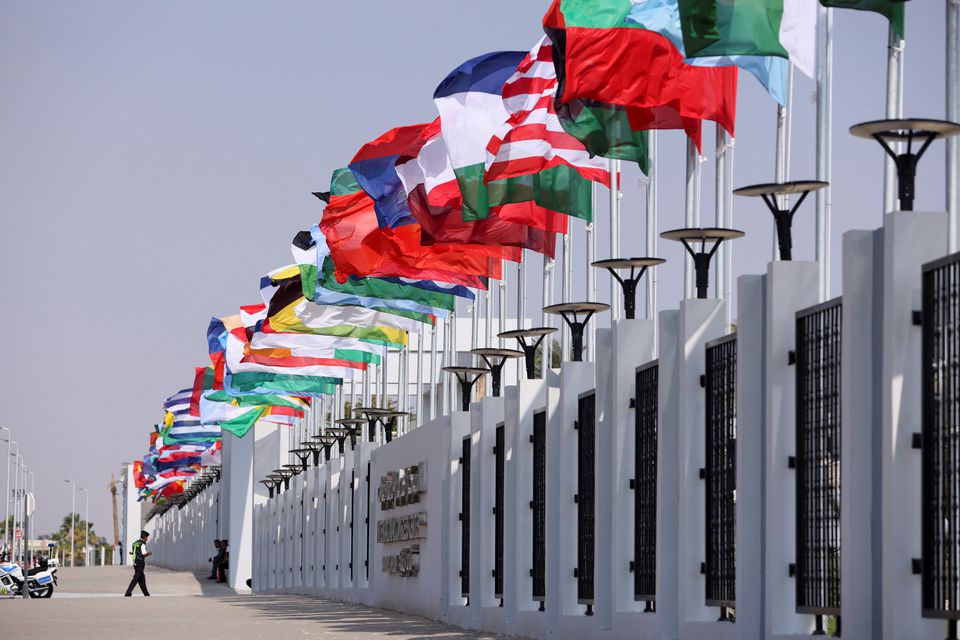SHARM EL-SHEIKH, Egypt, (Reuters) – Government ministers and negotiators from nearly 200 countries today began the hard slog of finding common ground for a deal at the annual U.N. climate summit, as host country Egypt assured that the slow-moving talks were still on track.
Some delegates began, however, to discuss the possibility that the summit would go overtime into the weekend, with countries still snagged on key issues including crucial funding for developing countries to combat and adapt to climate change.
Egypt’s Environment Minister Yasmine Fouad acknowledged that big sticking points remain unresolved, including a called-for doubling in finance to adapt for future climate disruptions and demands by developing nations for additional funds toward loss and damage.
But “most of the progress would come when the ministers are involved” this week, Fouad told Reuters.
The Egyptian COP27 Presidency on Monday night released a two-page sketch of what could become a deal, featuring bullet points outlining many of the issues countries have asked be included – including contentious points that have nations deeply divided.
The document mentioned the urgent need for action to keep within reach the goal of preventing global temperatures from rising more than 1.5C beyond preindustrial levels, to avoid the worst impacts of climate change. The world has already seen more than 1.1C of warming.
“We cannot lose 1.5 at this COP,” said Alok Sharma, president of last year’s U.N. climate summit, COP26, in Glasgow, Scotland.
But with little mention in the paper of burning fossil fuels – the main cause of global warming – the result of COP27 may focus on new commitments to get poorer nations cash to slow their emissions.
Delegates also have one eye firmly on Bali, where world leaders are meeting for the G20 summit, including China’s President Xi Jinping and his U.S. counterpart Joe Biden. On Monday, the two leaders of the world’s top two most polluting nations agreed to resume cooperation on climate change.
The draft document released Monday night is titled a “non-paper,” making clear it was far from an official draft of what might actually be approved by countries at the summit’s close, scheduled for Friday, as the core political agreement from the two-week event.
“It’s all boiling down to the last days,” EU environment policy chief Virginijus Sinkevicius told Reuters on the sidelines of the summit.
“It seems like still we are quite far from what we would love to have as an outcome, but I’m sure as more and more energy is put in, it will boil down to the last days and maybe last minutes,” he said.
Brazil’s top diplomat at the talks said that, aside from the released text, there were several other proposed texts circulating between delegations but were not yet ready to be made public.
“It’s natural, as time runs out, to reach more concrete and more ambitious decisions,” Paulino de Carvalho Neto told Reuters.
Nevertheless, he suggested the talks could extend beyond the Friday deadline into the weekend. “It is possible that this will happen. But it’s early for us to say that,” he said.
Belize negotiator Carlos Fuller said that countries discussing the document Tuesday evening could end up adding even more to the “laundry list” of issues so far outlined.
LOSS AND DAMAGE
A section in the draft on loss and damage – referring to funding for developing countries facing unavoidable damage caused by climate change – suggested the deal would address the “need for funding arrangements” to tackle this.
It did not, however, give any hint of whether the final deal will include a new loss and damage fund – which developing countries are demanding in the negotiations, but which the European Union and United States are wary of.
The failure by rich nations to deliver in full on a past pledge to deliver $100 billion in annual climate finance to developing countries has rankled in recent years of climate talks. Last year, wealthy nations paid about $83 billion toward the goal, but said they’d meet the full pledge only in 2023.
One of Egypt’s top climate envoys, U.N. High-Level Climate Champion Mahmoud Mohieldin, was seen Tuesday wearing a red button reading “#WTF” on his lapel – the slogan standing for “where’s the finance?”
“We cannot afford a further erosion of trust between the developed and developing countries,” said Samoa’s Prime Minister Fiame Naomi Mataafa.
“Let us make COP27 the turning point in our efforts to make the rhetoric history and the mirages real,” Mataafa said.
India surprised some countries last week by pushing for a deal at the summit to phase down all fossil fuels – rather than just coal, as countries agreed at last year’s U.N. summit. The draft COP27 text did not hint at which route the final deal will take on this issue.
Tom Evans, a policy analyst at non-profit think tank E3G, said the draft text did not reveal what is likely to make it into the final deal.
“Many of the issues hinted at in this paper are under live discussion at the G20 leaders summit,” he said, adding that what Group of 20 country leaders decide during their meeting Tuesday and Wednesday in Bali on issues including phasing down fossil fuels could steer the COP27 summit’s final outcome.

